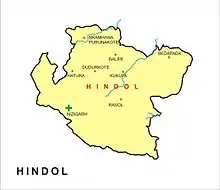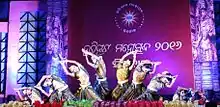Hindol, Odisha
Hindol is a town and subdivision in Dhenkanal District of Odisha state, India.

It is located 29 kilometres (18 mi) from NH 55 to Gudiakateni, 11 kilometres (6.8 mi) from NH 655 to Satamaili Chowk and is surrounded by reserve forest from the East, South and West. It was a part of the Hindol princely State before independence. It is 60 kilometres (37 mi) from Dhenkanal.
History
Hindol was home to the Hindol princely state with the Odisha States Agency during the British Raj. After the East India Company occupied Odisha in September–October 1803, treaties were signed with estates of the region, including Hindol. After independence of India, it merged into Republic of India in 1947.[1] Thereafter in 1948, once all the princely states including Dhenkanal, Talcher, Athmallik, Pal Lahara and Hindol formally merged with the province of Odisha, the present Dhenkanal district was created.[2]
Festivals
Hindol witnesses five festivals every year, of which three are major. The most important of these is the Rath Yatra.
Harihat Mahotsav

The Oldest Carnival of Hindol. Harihat Mela is converted as Harihat Mahotsav in the year of 2016. But Harihat Mela was an ancient traditional carnival of Hindol which was started many years ago before Twentieth hYatra.
Hindol Laxmi Puja Committee
Hindol Town 15 Laxmi Puja Committee. All Laxmi Puja Committee Name
- Radhakrushna Laxmi Puja Committee, Nutanpatana, Hindol
- Bus Stand Laxmi Puja Committee, Amalapada, Hindol
- Maudamani Laxmi Puja Committee, Post Office, Hindol
- Medical Choka Laxmi Puja Committee, Hindol
- Kalapana Bazar Laxmi Puja Committee, Hindol
- Mera Bazar Laxmi Puja Committee, Hindol
- Karigar Sahi Laxmi Puja Committee, Hindol
- Satya Sahi Laxmi Puja Committee, Nutanpatana-A, Hindol
- Gopala Sahi Laxmi Puja Committee, Nutanpatana-B, Hindol
- Banamalipur Laxmi Puja Committee, Hindol
- Pitabali Laxmi Puja Committee, Hindol
- Gopalapur Laxmi Puja Committee-A, Hindol
- Gopalapur Laxmi Puja Committee-B, Hindol
- Radhanathapura Laxmi Puja Committee, Hindol
- Champati Sahi Laxmi Puja Committee, Hindol
Politics
Hindol is an Odisha Legislative Assembly (Vidhan Sabha) constituency within the Dhenkanal parliamentary (Lok Sabha) constituency.[3][4]
Ancient history and origin of the region
The state Hindol was founded from Dudurkote (established before 800 AD) in 1554 by two brothers named Lakshman Mahratta and Bharat Mahratta belonging to the family of the Khimedi Raja of Ganjam, which also ruled over areas in the Madras region. After the East India Company occupied Odisha in September–October 1803, treaties were signed with estates of the region, including Hindol.
After the independence of India in 1947 Hindol merged into the Republic of India on 1 January 1948. Thereafter in 1948, once all the princely states including Dhenkanal, Talcher, Athmallik, Pal Lahara and Hindol formally merged with the province of Odisha, the present Dhenkanal district was created.
Rajas
| Tenure | Name |
|---|---|
| 1691–1701 | Achyuta Singh Narendra |
| 1701–1733 | Bhagabat Singh Narendra |
| 1733–1770 | Damodar Singh Narendra |
| 1770–1781 | Radhakant Singh Mardraj Jagadeb |
| 1781–1786 | Ram Chandra Singh Mardraj Jagadeb |
| 1786–1829 | Kishan Chandra Mardraj Jagadeb |
| 1829–1841 | Harihar Singh Mardraj Jagadeb |
| 1841–1874 | Ishwar Singh Mardraj Jagadeb |
| 1874–1877 | Phokar Singh Mardraj Jagadeb |
| 18 Jul 1877 – 10 Feb 1906 | Janardan Mardraj Jagadeb (b. 1853 - d. ....) |
| 10 Feb 1906 – 15 Aug 1947 | Naba Kishor Chandra Mardraj Jagadeb (b. 1891 - d. 19...) |
Sarbarakar & Royal Responsibilities
| Tenure | Name & Details |
|---|---|
| 800–1800 | Father and Forehead grandfather of Satyabadi Pratap Singh Garnaik |
| 1800–1840 | Satyabadi Pratap Singh Garnaik |
| 1840–1875 | Madhu Sardar Singh Garnaik son of Satyabadi Pratap Singh Garnaik |
| 1875–1890 | Ghasia Sardar Singh Garnaik son of Satyabadi Pratap Singh Garnaik |
| 1890 - 1906 | Champettra Sardar Singh Garnaik son of Madhu Sardar Singh Garnaik |
| 1906–1938 | Sana Adhyaksh Senapati Nakula Samant Sinhar son of Ghasia Sardar Singh Garnaik |
| 1920–1961 | Sarbarakar Fakira Charan Garnaik son of Ghasia Sardar Singh
Sadananda Garnaik son of Nakula Samant Sinhar Baikuntha Garnaik son of Sarbarakar Fakira Charan Garnai Kedar Kishor Garnaik son of Sarbarakar Fakira Charan Garnaik Sena Adhyaksh Senapati 'Nakula Samanta Sinhara'Nakula Samanta Sinhara (1905/1906 -16 April 1938) was a prominent figure of the Indian independence movement in Hindol princely state. with the Odisha States Agency during British Raj era. He is an Indian nationalist considered to be one of the most influential revolutionaries and whose defiant patriotism made him a prominent Sena Adhyaksh and freedom fighter in Hindol. He was popularly known as Sena Adhyaksh (Senapati) & Commander-in-Chief of king of Hindol. Early lifeNakula Samanta Sinhara was born in 1905/1906 in Baghua Sahi, Dudurkote, Hindol in Dhenkanal district of Odisha. He was spent his childhood time in Baghuasahi, Dudurkote, Hindol with his family members. He had five brothers and two sisters among them Nakula Samanta Sinhara was elder one. He was son of Ghasia Charana Garnaik(Shardar) and grandson of Satyabadi Pratap Singh Garnaik who was the Pragana Officer & Chief-administrative of king of Hindol. He was starting his schooling in Khordha, Odisha and after completed his schooling, He started learning on war knowledge (Yudha Vidhya) in Khordha, Odisha and returned to his native place Dudurkote, Hindol princely state after completion of his schooling. He was observed his grandfather Satyabadi Pratap Singh Garnaik activities related to administrative and war knowledge (Yudha Vidhya) and learnt lots of things from his grandfather during his childhood time. His grandfather Satyabadi Pratap Singh Garnaik trained him to all war knowledge(Yudha Vidhya) in such a way anyone could not beat him in his life. Royal responsibilitiesBeing an excellent scholar in education and war knowledge (Yudha Vidhya) like his grandfather Satyabadi Pratap Singh Garnaik. He was ascended as the Sena Adhyaksh and Chief of the administration of Army of Hindol on early age of 20 or 21 and carried out his duties till his death. A prominent warrior Sena Adhyaksh(Senapati) & Commander-in-Chief of King Hindol, beaten 16s Sena Adhyaksh of different Princely state on his combatant during the competition of Sena Adhyaksh between different princely state of Orissa like (Talacher, Dhenkanal, Narasinghpur, Bamra, Athagarh, Rairakhol, Nayagarh, AUL(Cuttack), Athamallick, Baramba, Sukinda, Gangpur, Nilgiri, Bolangir and Kalahandi ). He had shown and proved the strength and power of, Hindol princely state and his courage feared to other Princely state of Orissa during on his duties. He could not tolerate any illegal activity and was very strict in his duties. Revolt Against the BritishHe had revolted against the British Raj in the province on 1936 and formed the Praja Mandal with the other people of Hindol princely state and elected as a president. The first Praja Mandal Andolan from Hindol held in the year July 1937 in Balika School, Dudurkote, Hindol. He was the first man from Hindol who attended and led the second meeting of Praja Mandal Andolan held at Cuttack, Odisha in the year 1938 from Hindol. He had been exploiting to inspire other princely states Sena Adhyakshas (Talacher, Dhenkanal, Narasinghpur, Bamra, Athagarh, Rairakhol, Nayagarh, Bolangir and Kalahandi etc.…) to revolt against the British. Arrested by British in April 1938He was arrested and kept in internment(Nazzer Bandhi) by the Political Agent of British Raj, Nellore Saheb and the assistant Dewan with four false case that was preplanned by assistant Dewan(Chakradhar Acharya) of Hindol related to Indian independence movement from Hindol, during the absent of Raj Naba Kishore Singh Mardraj Jagdeb on his visited for Darshan of Lord Jagannath Temple, Puri. Relieved from internment (Nazzer Bandhi)When Raja Naba Kishore Singh Mardraj Jagdeb came back from Lord Jagannath Temple, Puri, saw his Sena Adhyaksh in internment(Nazzer Bandhi) and asked immediate relieved his Sena Adhyaksh from internment(Nazzer Bandhi) that made by Political Agent of British Raj Nellore Saheb & assistant Dewan(Chakradhar Acharya) and said officially to Sinhara, do not involved in Praja Mandal Andolan against British Raj but personally and non-officially supported to Senapati Nakula Samanta Sinhara against British Raj . During internment (Nazzer Bandhi) Sinhara's health suffered in severe fever and his health was feeling unwell. Conspiracy on 15 April 1938After relieved from internment (Nazzer Bandhi), assistant Dewan(Chakradhar Acharya) afraid to Senapati Nakula Samanta Sinhara for his five false cases that were made by assistant Dewan (Chakradhar Acharya) with preplanned conspiracy with British during the absent of Raj Naba Kishore Singh Mardraj Jagdeb. During internment (Nazzer Bandhi) Senapati Nakula Samanta Sinhara's health suffered in severe fever and his health was feeling unwell. Senapati Nakula Samanta Sinhara had treatment his health from fever and medicines gave him by Baidya (Madhu Doctor) for recovery his health, But Baidya(Madhu Doctor) had bought by assistant Dewan (Chakradhar Acharya) & British and gave slow poison on his medicine that he toke for fever and his death happened on midnight during in his slept on bed at Hindol and take piece in rest. When Raj Naba Kishore Singh Mardraj Jagded had got this information from folks, and took immediate action against to assistant Dewan (Chakradhar Acharya) and Baidya(Madhu Doctor) on this preplanned murder against Senapati Nakula Samanta Sinhar and planned to give hard punishment to assistant Dewan (Chakradhar Acharya) and Baidya (Madhu Doctor), but they escaped to Cuttack from Hindol and never returned to Hindol. Nakula Samanta Sinhara's dead body brought to his native place at Baghua Sahi, Dudurkote, Hindol and his cremation with respected of martyr by presence of his younger brother Zamindar Sarbarakar Fakir Charan Garnaik and Raj Naba Kishore Singh Mardraj Jagdeb king of Hindol with 25 litres of cow ghee and one cart of sandalwood. Currently that place was besides of Dudurkote gram panchayat office. Family membersSinhara had three daughter, one son, five brothers & two sisters named as
DeathSinhara died on 16 April 1938 in Hindol. His cremation with respected of martyr and a freedom fighter & first man who led the Indian independence movement from Hindol. This day was declared as a black day for Hindol. Sarbarakar 'Fakira Charan Garnaik'Fakira Charan Garnaik(1909-1969) was the most popular and leading Sarbarakar of Hindol princely state. A Sarbarakar in the Indian subcontinent was an aristocrat. The term means 'Land Lord, Debottar, Khamara, Society Activities' in Odisha States Agency . Typically hereditary, Sarbarakar held enormous tracts of land, society activities and control over their peasants, from whom they reserved the right to collect tax on behalf of imperial courts or for military and improvement the society activities purposes. Sarbarakar was a royal responsibility of Land Lord (Land owner of state), Debottar(Religious endowments made in favour of temples), Khamar(Water endowments made in favour of society), Social Activities and Chief representative of princely state in Odisha States Agency during British Raj era. Sarbarakar also known as Malikana(Chief) incharge for collection of revenue and most not show disloyalty, Should not fail to pay the total revenue collected from the people in princely state. In Odisha States Agency during British Raj era, The important leading Sarbarakar as Fakira Charan Garnaik(1909-1969) of Hindol princely state. |
References
- Dr. Bhagyalipi Malla (August 2007). "Amalgamation of Princely States" (PDF). Orissa Review. p. 94,98. Retrieved 18 July 2013.
- Subrata K. Mitra (31 January 2002). Power, Protest and Participation: Local Elites and Development in India. Taylor & Francis. pp. 63–. ISBN 978-0-203-22168-6. Retrieved 18 July 2013.
- Assembly Constituencies and their EXtent
- Seats of Odisha